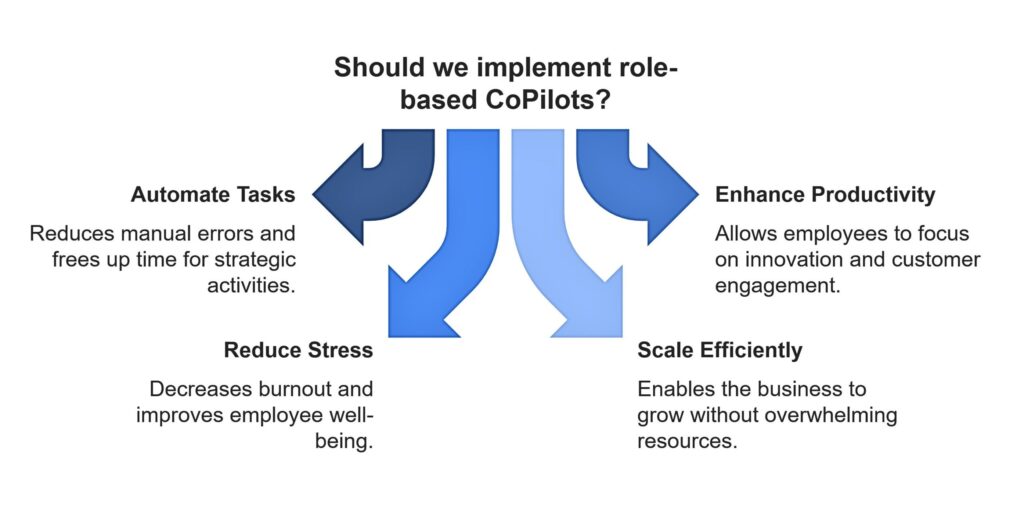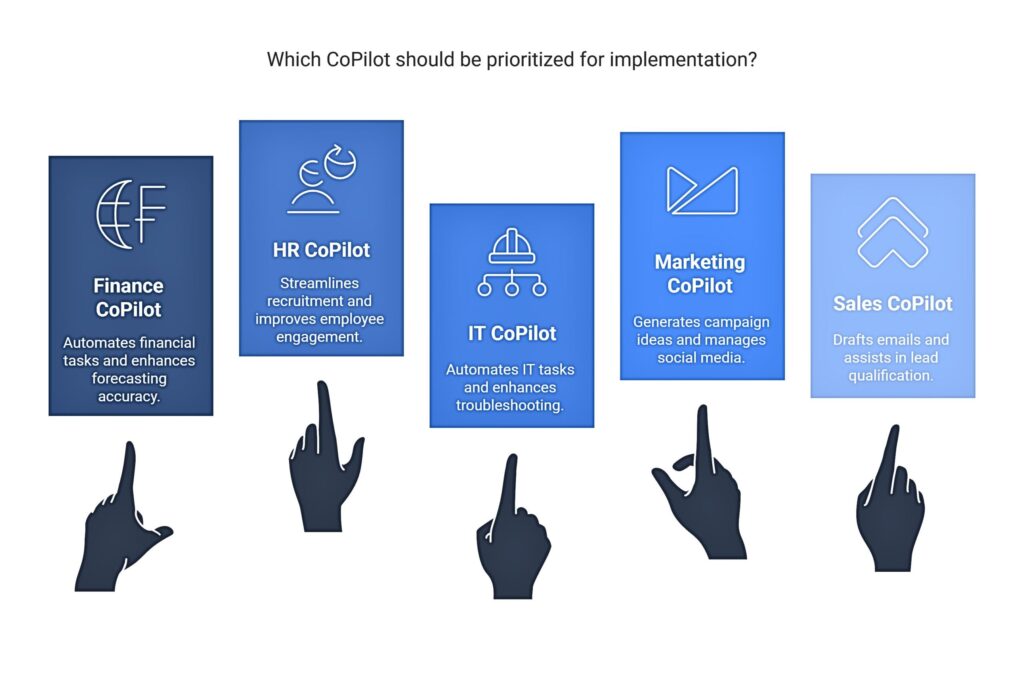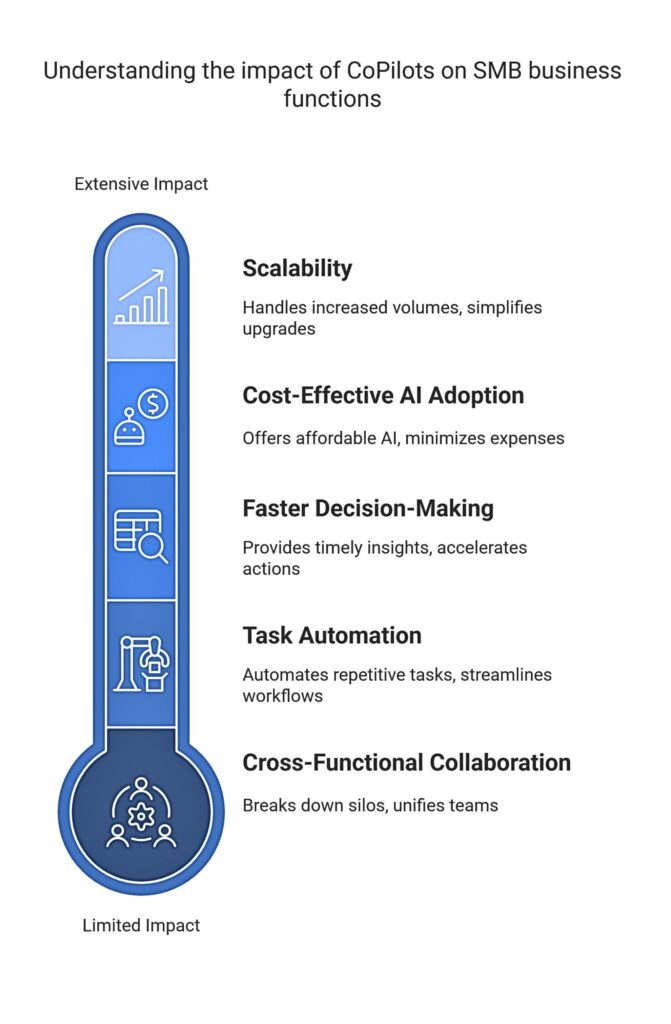- May 23, 2025
“By 2026, over 80% of enterprises will use generative AI APIs or models in production environments.” – Gartner.
But you don’t need to be a Fortune 500 company to tap into that power. Even small companies can utilize that power. SMBs have an opportunity to skyrocket using role-based CoPilot, which are AI assistants that automate work, streamline effectiveness, and create real value everywhere in the organization.
While large businesses generally employ bigger teams, small and medium-sized businesses consist of a rather lean workforce and tend to adopt multitasking as part of their operational activities. Nevertheless, function-specific CoPilot can relieve pressure off the shoulders of their users by automating those repetitive processes to allow employees to devote time to strategic work.
This blog explains how Microsoft Power Platform integrated with GPT, CoPilot can be an efficient and cost-effective approach for SMBs to realize and embrace the power of AI.
Now, small to medium-sized businesses (SMBs) can easily access advanced features of artificial intelligence with Microsoft Power Platform’s integration with GTP and CoPilot.
Come, join us to explore in deep!!
Why Role-Based CoPilots Are Essential for SMBs

In small to medium enterprises with limited resources and compact teams, employees frequently wear multiple hats. Time and concentration are precious few in such settings, the space where role-based CoPilots make the difference.
By employing role-based, AI-powered Copilots in the areas of finance, human resources, IT, operations, or sales, SMBs can automate everyday tasks, including data entry, report making, email replies, schedule coordination, and workflow management.
Automating these tasks releases time for employees and also reduces the risk of human error often associated with doing it manually.
With CoPilots handling the mundane or probably time-consuming activities, employees would turn their attention to strategic areas like customer engagement, innovation, and business growth. This raises employee productivity, lowers stress, and decreases the likelihood of burnout, making for a complete win-win.
Ultimately, role-based CoPilots help small businesses work smarter and not harder, enabling every team member to accomplish more with less and allowing the business to scale more efficiently.
Why SMBs Can Benefit the Most from CoPilots
All small and mid-sized businesses (SMBs) handle a myriad of responsibilities but have very few resources and staff to do so. It becomes necessary to increase productivity without hiring anyone in this environment.
Role-based CoPilots will help bridge such a scenario where it automates routine tasks, aids decisions, and streamlines workflows – without requiring advanced technical skills.
Instead, SMBs can make efficiency gains, reduce errors, and respond to changing business needs faster-all without being overly expensive-by empowering employees in their departments with intelligent, responsive tools.
Role-based CoPilots automate routine tasks, aid in decision-making, and streamline the workflows, thereby bridging that scenario without any kind of advanced technical skills.
What Is Microsoft Power Platform + GPT Integration?
The Microsoft Power Platform is a low-code suite that enables companies to create custom apps (Power Apps), automate workflows (Power Automate), analyze data (Power BI), and build chatbots (Power Virtual Agents). It’s made to help teams quickly come up with solutions to everyday problems without much coding.
The Power Platform becomes even stronger with GPT integration. It gives intelligent language abilities like summarization, content generation, Q&A, and sentiment analysis, added directly into apps and flows. These CoPilots now can understand natural language, respond in a human-like manner, and automate repetitive tasks across departments.
With its latest updates, Microsoft has embedded GPT-powered CoPilots into the core of the platform, thus enabling SMBs to easily build, deploy, and scale AI-based assistants customized for every role.
Use Cases: Building CoPilots for Core Business Roles

CoPilot for Finance
A Finance Copilot could automate time-consuming activities from approving invoices and summarizing financial data into easy-to-read reports.
In addition, it could assist in building precise forecasting models by merging the analytical prowess of Power BI analytics with predictive insights from GPT, assisting finance teams to take faster and better-informed decisions.
CoPilot for HR
An HR CoPilot can automate screening and ranking of resumes, allowing a more streamlined recruitment process. It could also power onboarding Q&A bots to assist new employees or use sentiment analysis from feedback surveys to suggest better employee engagement efforts to HR teams and thus improve workplace culture.
CoPilot for IT
In IT operations, a CoPilot could help triage incoming tickets, suggest resolutions, and automate redundant tasks, for instance, resetting passwords using Power Automate. Additionally, GPT integration and its own issues detection provide hands-on guidance in troubleshooting, all enhancing the capability of IT teams to find faster and more precise technical solutions.
CoPilot for Marketing
A Marketing CoPilot could both generate brand new campaign copy ideas and facilitate tracking engagement through Power BI dashboards, as well as managing automatic social media replies.
Ultimately, it affords teams the time and processing power necessary to be creative, data-driven, and responsive without an undue burden of manual tasks.
CoPilot for Sales
The Sales CoPilot can help draft tailored sales emails, synthesize critical CRM records for quick updates, and assist in lead qualification based on historical data patterns.
This will allow sales to refocus their effort on relationship development and closing deals rather than be overwhelmed by paperwork.
Benefits of Role-Based CoPilots for SMBs

Task Automation for Non-Technical Teams: Many SMBs do not possess large IT divisions that can construct such automation for themselves. Role-based CoPilots plug that gap, enabling non-technical people to automate their repetitive work through intuitive no-code or low-code interfaces.
Whether it’s auto-approving standard invoices, responding to routine HR queries, or scheduling meetings, the employees can streamline their workload and focus on high-value activities-all without writing a single line of code.
Faster Decision-Making: In the case of SMBs, speed usually equals success. CoPilots for SMBs provide summaries, forecasts, and data-driven suggestions on demand directly into the tools used by the team.
Employees won’t have to dig through spreadsheets or long reports anymore, because they’ll get timely insights that help them act faster, which translates into helping them respond to customer queries faster, doing better financial planning, and being more agile.
Cost-Effective AI Adoption: Enterprise AI solutions are out of reach for most SMB budgets. CoPilots based on Microsoft Power Platform and GPT provide a realistic substitute.
They offer advanced AI capabilities without the need for expensive software developments, infrastructure, or specialized AI teams.
It is pay-as-you-grow for SMBs building and increasing their AI capabilities over time, thus increasing value while minimizing costs.
Improvement in Cross-Functional Collaboration: Role-based CoPilots could allow the linking of department silos. For example, if a particular Sales CoPilot shared forecast data automatically with Finance, or an HR CoPilot synchronized onboarding tasks with IT for employee setup in a faster manner, they would have taken integration to a new level.
This will also minimize communication silos and thus ensure teams are aligned and create a much more unified collaborative workplace.
Scalability: As the SMB grows, its requirements also increase. Activity scaling up through CoPilots would not mean scaling up the corresponding workforce size.
Be it support tickets, marketing data, or an extensive vendor network, CoPilots are capable of gaining additional volumes and complexities without much ado. Furthermore, upgrades and added functionalities can be done over time without complete rebuilding.
Challenges and Considerations for SMBs
Licensing and API Cost Management: While Power Platform and GPT integrations provide amazing value, monitoring the licensing fees and API usage costs becomes critical for SMBs. Without oversight, the expenditure may spiral out of control. Businesses should monitor consumption trends closely, select appropriate licensing options, and impose limits on usage to remain within operating budgets.
Data Privacy and Handling Sensitive Information: With AI integrated into the business workflow, customer data, financial records, HR info, and others are being processed.
Depending on the industry, the SMB must ensure that any information they share with AI models adheres to certain privacy regulations like GDPR or HIPAA.
Maintaining trust and compliance necessitates secure storage of data, encryption, and well-defined access control.
AI Hallucinations – Setting Up Safeguards: AI models, including GPT, sometimes produce outputs that are inaccurate or can be considered misleading (referred to as “hallucinations”).
Considering the implications of AI-driven suggestions and outputs, especially in critical areas such as finance or customer communications, particularly in ensuring the validity of such outputs, SMB needs to set up verification measures, such as human-in-the-loop review processes or formally defined business rules.
Internal Adoption – Change Management Strategies: Many resistances will be encountered when rolling out CoPilots, should the teams be unprepared for change. The appropriate change management strategies must be put in place for the way forward for all SMB stakeholders, leadership buy-in, user training, communication on what good is in it for them, and enthusiasm building, early addressing of fears, and celebrating small wins will lead the path for a smoother transition across the organization.
Training in Power Platform Tools: Employees must feel comfortable using Power Platform tools, including Power Automate, Power Apps, and Power BI, to really maximize the benefits brought by CoPilots.
This will require some investment in introductory training, fostering a culture of experimentation, and providing ongoing support that will make non-technical teams feel empowered to continuously adopt, improve, and expand their own CoPilot use cases.
Conclusion
As SMBs search for smarter and more scalable options to run their businesses, role-based CoPilots based on Microsoft Power Platform and GPT provide a tremendous opportunity. They automate mundane tasks, expedite decisions, create opportunities for cross-functional collaboration, and bring AI closer to the business end user too, without needing a full development team.
Starting with simple, role-based solutions, businesses can gradually build an AI-intelligent culture that furthers their growth and innovation. The future of SMB automation has arrived, and it has never been this accessible.
For more information, visit www.hexacorp.com
Happy Learning!!
